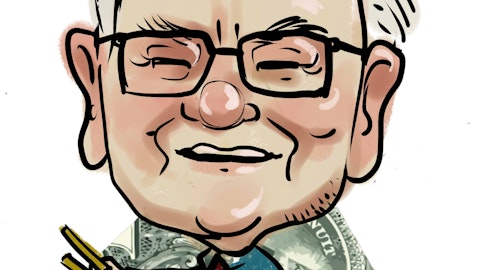3. Baidu, Inc. (NASDAQ: BIDU)
Number of Hedge Fund Holders: 89
Forward PE Ratio: 19.4
Baidu, Inc. (NASDAQ: BIDU) is a Chinese technology company founded in 2000. It is placed third on our list of 10 undervalued blue chip stocks hedge funds are piling into. The stock has offered investors returns exceeding 61% over the course of the past twelve months. Baidu has interests in several internet-related businesses in China, including the search engine market, artificial intelligence, mobile ecosystem, self-driving cars, and others. The company is one of the most popular foreign equities on the US market.
In quarterly earnings results for the first three months of 2021, posted on May 18, Baidu, Inc. (NASDAQ: BIDU) reported earnings per share of RMB12.38, easily beating market predictions by RMB1.63. The revenue for the first quarter was over RMB28 billion, up close to 25% year-on-year.
On April 29, Baidu, Inc. (NASDAQ: BIDU) had announced that it would be launching a driverless robotaxi service, called Apollo Go Robotaxi, at a venue in China ahead of the Beijing Winter Olympics scheduled for 2022.
At the end of the first quarter of 2021, 89 hedge funds in the database of Insider Monkey held stakes worth $6.5 billion in Baidu, Inc. (NASDAQ: BIDU), up from 51 in the preceding quarter worth $4.6 billion.
In its Q1 2021 investor letter, Horos Asset Management, an asset management firm, highlighted a few stocks and Baidu, Inc. (NASDAQ: BIDU) was one of them. Here is what the fund said:
“We have also fully exited our stake in Baidu, following their outstanding performance during the period and their lower relative upside potential compared to other investment alternatives, which we will discuss below.
The Chinese technology platform company Baidu has also been held in the portfolios managed by Alejandro, Miguel and myself for several years. During this period, we have seen very high volatility in its share price, which we have taken advantage of to make significant rebalancing moves in our position (in fact, we even sold our entire position once, when we thought the stock’s upside potential was exhausted). After several years of instability, market sentiment turned very positive, putting an end to the historical advertising problems in the healthcare sector, the divestments in O2O (Online-to-Offline) businesses that continued to weigh on the company’s margins, the IPO of part of the iQiyi streaming business (which hid Baidu’s underlying cash generation capacity) and the tough competition from other industry giants such as Tencent and Alibaba, as well as the entry of new players with disruptive business models (ByteDance). At the same time, the company’s recent commitment to electric vehicles contributed even more to this change of narrative. Baidu’s share price rose almost fourfold from the March 2020 lows to all-time highs and reached a valuation where the margin of safety, in our view, was too narrow.”





